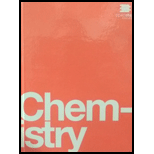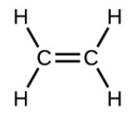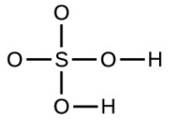
Chemistry by OpenStax (2015-05-04)
1st Edition
ISBN: 9781938168390
Author: Klaus Theopold, Richard H Langley, Paul Flowers, William R. Robinson, Mark Blaser
Publisher: OpenStax
expand_more
expand_more
format_list_bulleted
Concept explainers
Textbook Question
Chapter 2, Problem 29E
Write the molecular and empirical formulas of the following compounds:



Expert Solution & Answer
Want to see the full answer?
Check out a sample textbook solution
Students have asked these similar questions
Five chemistry project topic that does not involve practical
Please correct answer and don't used hand raiting
Q2. Consider the hydrogenation of ethylene
C2H4 + H2 = C2H6
The heats of combustion and molar entropies for the three gases at 298 K are given by:
C2H4
C2H6
H2
AH comb/kJ mol¹
-1395
-1550
-243
Sº / J K¹ mol-1
220.7
230.4
131.1
The average heat capacity change, ACP, for the reaction over the temperature range 298-1000 K is
10.9 J K¹ mol¹. Using these data, determine:
(a) the standard enthalpy change at 800 K
(b) the standard entropy change at 800 K
(c) the equilibrium constant at 800 K.
Chapter 2 Solutions
Chemistry by OpenStax (2015-05-04)
Ch. 2 - In the following drawing, the green spheres...Ch. 2 - Which postulate of Dalton’s theory is consistent...Ch. 2 - Identify the postulate of Dalton’s theory that is...Ch. 2 - Samples of compound X, Y, and Z are analyzed, with...Ch. 2 - The existence of isotopes violates one of the...Ch. 2 - How are electrons and protons similar? How are...Ch. 2 - How are protons and neutrons similar? How are they...Ch. 2 - Predict and test the behavior of a particles fired...Ch. 2 - Predict and test the behavior of a particles fired...Ch. 2 - In what way are isotopes of a given element always...
Ch. 2 - Write the symbol for each of the following ions:...Ch. 2 - Write the symbol for each of the following ions:...Ch. 2 - Open the Build an Atom simulation...Ch. 2 - Open the Build an Atom simulation...Ch. 2 - Open the Build an Atom simulation...Ch. 2 - Determine the number of protons, neutrons, and...Ch. 2 - The following are properties of isotopes of two...Ch. 2 - Give the number of protons, electrons, and...Ch. 2 - Give the number of protons, electrons, and...Ch. 2 - Click on the site...Ch. 2 - Click on the site...Ch. 2 - An element has the following natural abundances...Ch. 2 - Average atomic masses listed by JUPAC are based on...Ch. 2 - Variations in average atomic mass may be observed...Ch. 2 - The average atomic masses of some elements may...Ch. 2 - The 18O:16O abundance ratio in some meteorites is...Ch. 2 - Explain why the symbol for an atom of the element...Ch. 2 - Explain why the symbol for the element sulfur and...Ch. 2 - Write the molecular and empirical formulas of the...Ch. 2 - Write the molecular and empirical formulas of the...Ch. 2 - Determine the empirical formulas for the following...Ch. 2 - Determine the empirical formulas for the following...Ch. 2 - Write the empirical formulas for the following...Ch. 2 - Open the Build a Molecule simulation...Ch. 2 - Open the Build a Molecule simulation...Ch. 2 - Open the Build a Molecule simulation...Ch. 2 - Using the periodic table, classify each of the...Ch. 2 - Using the periodic table, classify each of the...Ch. 2 - Using the periodic table, Identify the lightest...Ch. 2 - Using the periodic table, Identify the heaviest...Ch. 2 - Use the periodic table to give the name and symbol...Ch. 2 - Use the periodic table to give the name and symbol...Ch. 2 - Write a symbol for each of the following neutral...Ch. 2 - Write a symbol for each of the following neutral...Ch. 2 - Using the periodic table, predict whether the...Ch. 2 - Using the periodic table, predict whether the...Ch. 2 - For each of the following compounds, state whether...Ch. 2 - For each of the following compounds, state whether...Ch. 2 - For each of the following pairs of ions, write the...Ch. 2 - For each of the following pairs of ions, write the...Ch. 2 - Name the following compounds: CsCl BaO K2S BeCl2...Ch. 2 - Name the following compounds: NaF Rb2O BCl3 H2Se...Ch. 2 - Write the formulas of the following compounds:...Ch. 2 - Write the formulas of the following compounds:...Ch. 2 - Write the formulas of the following compounds:...Ch. 2 - Write the formulas of the following compounds:...Ch. 2 - Each of the following compounds contains a metal...Ch. 2 - Each of the following compounds contains a metal...Ch. 2 - The following ionic compounds are found in common...Ch. 2 - The following ionic compounds are found in common...Ch. 2 - What are the IUPAC names of the following...
Additional Science Textbook Solutions
Find more solutions based on key concepts
A source of electromagnetic radiation produces infrared light. Which of the following could be the wavelength ...
Chemistry: The Central Science (14th Edition)
1. Why is the quantum-mechanical model of the atom important for understanding chemistry?
Chemistry: Structure and Properties (2nd Edition)
In your own words, briefly distinguish between relative dates and numerical dates.
Applications and Investigations in Earth Science (9th Edition)
Endospore formation is called (a) _____. It is initiated by (b) _____. Formation of a new cell from an endospor...
Microbiology: An Introduction
Where are skeletal cartilages located?
Human Anatomy & Physiology (2nd Edition)
A backpacker wants to carry enough fuel to heat 2.5 kg of water from 25 C to 100.0 C. If the fuel she carries p...
Introductory Chemistry (6th Edition)
Knowledge Booster
Learn more about
Need a deep-dive on the concept behind this application? Look no further. Learn more about this topic, chemistry and related others by exploring similar questions and additional content below.Similar questions
- 13. (11pts total) Consider the arrows pointing at three different carbon-carbon bonds in the molecule depicted below. Bond B Bond A Bond C a. (2pts) Which bond between A-C is weakest? Which is strongest? Place answers in appropriate boxes. Weakest Bond Strongest Bond b. (4pts) Consider the relative stability of all cleavage products that form when bonds A, B, AND C are homolytically cleaved/broken. Hint: cleavage products of bonds A, B, and C are all carbon radicals. i. Which ONE cleavage product is the most stable? A condensed or bond line representation is fine. ii. Which ONE cleavage product is the least stable? A condensed or bond line representation is fine. c. (5pts) Use principles discussed in lecture, supported by relevant structures, to succinctly explain the why your part b (i) radical is more stable than your part b(ii) radical. Written explanation can be no more than one-two succinct sentence(s)! Googlearrow_forwardPrint Last Name, First Name Initial Statifically more chances to abstract one of these 6H 11. (10pts total) Consider the radical chlorination of 1,3-diethylcyclohexane depicted below. 4 4th total • 6H total 래 • 4H total 21 total ZH 2H Statistical H < 3° C-H weakest - product abstraction here bund leads to thermo favored a) (6pts) How many unique mono-chlorinated products can be formed and what are the structures for the thermodynamically and statistically favored products? Product 6 Number of Unique Mono-Chlorinated Products Thermodynamically Favored Product Statistically Favored Product b) (4pts) Draw the arrow pushing mechanism for the FIRST propagation step (p-1) for the formation of the thermodynamically favored product. Only draw the p-1 step. You do not need to include lone pairs of electrons. No enthalpy calculation necessary H H-Cl Waterfoxarrow_forward10. (5pts) Provide the complete arrow pushing mechanism for the chemical transformation → depicted below Use proper curved arrow notation that explicitly illustrates all bonds being broken, and all bonds formed in the transformation. Also, be sure to include all lone pairs and formal charges on all atoms involved in the flow of electrons. CH3O II HA H CH3O-H H ①arrow_forward
- Do the Lone Pairs get added bc its valence e's are a total of 6 for oxygen and that completes it or due to other reasons. How do we know the particular indication of such.arrow_forwardNGLISH b) Identify the bonds present in the molecule drawn (s) above. (break) State the function of the following equipments found in laboratory. Omka) a) Gas mask b) Fire extinguisher c) Safety glasses 4. 60cm³ of oxygen gas diffused through a porous hole in 50 seconds. How long w 80cm³ of sulphur(IV) oxide to diffuse through the same hole under the same conditions (S-32.0.0-16.0) (3 m 5. In an experiment, a piece of magnesium ribbon was cleaned with steel w clean magnesium ribbon was placed in a crucible and completely burnt in oxy cooling the product weighed 4.0g a) Explain why it is necessary to clean magnesium ribbon. Masterclass Holiday assignmen PB 2arrow_forwardHi!! Please provide a solution that is handwritten. Ensure all figures, reaction mechanisms (with arrows and lone pairs please!!), and structures are clearly drawn to illustrate the synthesis of the product as per the standards of a third year organic chemistry course. ****the solution must include all steps, mechanisms, and intermediate structures as required. Please hand-draw the mechanisms and structures to support your explanation. Don’t give me AI-generated diagrams or text-based explanations, no wordy explanations on how to draw the structures I need help with the exact mechanism hand drawn by you!!! I am reposting this—ensure all parts of the question are straightforward and clear or please let another expert handle it thanks!!arrow_forward
- In three dimensions, explain the concept of the velocity distribution function of particles within the kinetic theory of gases.arrow_forwardIn the kinetic theory of gases, explain the concept of the velocity distribution function of particles in space.arrow_forwardIn the kinetic theory of gases, explain the concept of the velocity distribution function of particles.arrow_forward
- Hi!! Please provide a solution that is handwritten. this is an inorganic chemistry question please answer accordindly!! its just one question with parts JUST ONE QUESTION with its parts spread out till part (g), please answer EACH part till the end and dont just provide wordy explanations wherever asked for structures, please DRAW DRAW them on a paper and post clearly!! answer the full question with all calculations step by step EACH PART CLEARLY please thanks!! im reposting this please solve all parts and drawit not just word explanations!!arrow_forwardHi!! Please provide a solution that is handwritten. this is an inorganic chemistry question please answer accordindly!! its just one question with parts JUST ONE QUESTION, please answer EACH part PART A AND PART B!!!!! till the end and dont just provide wordy explanations wherever asked for structures, please DRAW DRAW them on a paper and post clearly!! answer the full question with all details EACH PART CLEARLY please thanks!! im reposting this please solve all parts and drawit not just word explanations!!arrow_forwardHi!! Please provide a solution that is handwritten. this is an inorganic chemistry question please answer accordindly!! its just one question with parts JUST ONE QUESTION, please answer EACH part till the end and dont just provide wordy explanations wherever asked for structures, please DRAW DRAW them on a paper and post clearly!! answer the full question with all details EACH PART CLEARLY please thanks!! im reposting this please solve all parts and drawit not just word explanations!!arrow_forward
arrow_back_ios
SEE MORE QUESTIONS
arrow_forward_ios
Recommended textbooks for you
 Chemistry: The Molecular ScienceChemistryISBN:9781285199047Author:John W. Moore, Conrad L. StanitskiPublisher:Cengage Learning
Chemistry: The Molecular ScienceChemistryISBN:9781285199047Author:John W. Moore, Conrad L. StanitskiPublisher:Cengage Learning Chemistry by OpenStax (2015-05-04)ChemistryISBN:9781938168390Author:Klaus Theopold, Richard H Langley, Paul Flowers, William R. Robinson, Mark BlaserPublisher:OpenStax
Chemistry by OpenStax (2015-05-04)ChemistryISBN:9781938168390Author:Klaus Theopold, Richard H Langley, Paul Flowers, William R. Robinson, Mark BlaserPublisher:OpenStax World of Chemistry, 3rd editionChemistryISBN:9781133109655Author:Steven S. Zumdahl, Susan L. Zumdahl, Donald J. DeCostePublisher:Brooks / Cole / Cengage Learning
World of Chemistry, 3rd editionChemistryISBN:9781133109655Author:Steven S. Zumdahl, Susan L. Zumdahl, Donald J. DeCostePublisher:Brooks / Cole / Cengage Learning Chemistry: Principles and PracticeChemistryISBN:9780534420123Author:Daniel L. Reger, Scott R. Goode, David W. Ball, Edward MercerPublisher:Cengage Learning
Chemistry: Principles and PracticeChemistryISBN:9780534420123Author:Daniel L. Reger, Scott R. Goode, David W. Ball, Edward MercerPublisher:Cengage Learning General, Organic, and Biological ChemistryChemistryISBN:9781285853918Author:H. Stephen StokerPublisher:Cengage Learning
General, Organic, and Biological ChemistryChemistryISBN:9781285853918Author:H. Stephen StokerPublisher:Cengage Learning Chemistry & Chemical ReactivityChemistryISBN:9781337399074Author:John C. Kotz, Paul M. Treichel, John Townsend, David TreichelPublisher:Cengage Learning
Chemistry & Chemical ReactivityChemistryISBN:9781337399074Author:John C. Kotz, Paul M. Treichel, John Townsend, David TreichelPublisher:Cengage Learning

Chemistry: The Molecular Science
Chemistry
ISBN:9781285199047
Author:John W. Moore, Conrad L. Stanitski
Publisher:Cengage Learning

Chemistry by OpenStax (2015-05-04)
Chemistry
ISBN:9781938168390
Author:Klaus Theopold, Richard H Langley, Paul Flowers, William R. Robinson, Mark Blaser
Publisher:OpenStax

World of Chemistry, 3rd edition
Chemistry
ISBN:9781133109655
Author:Steven S. Zumdahl, Susan L. Zumdahl, Donald J. DeCoste
Publisher:Brooks / Cole / Cengage Learning

Chemistry: Principles and Practice
Chemistry
ISBN:9780534420123
Author:Daniel L. Reger, Scott R. Goode, David W. Ball, Edward Mercer
Publisher:Cengage Learning

General, Organic, and Biological Chemistry
Chemistry
ISBN:9781285853918
Author:H. Stephen Stoker
Publisher:Cengage Learning

Chemistry & Chemical Reactivity
Chemistry
ISBN:9781337399074
Author:John C. Kotz, Paul M. Treichel, John Townsend, David Treichel
Publisher:Cengage Learning
Types of Matter: Elements, Compounds and Mixtures; Author: Professor Dave Explains;https://www.youtube.com/watch?v=dggHWvFJ8Xs;License: Standard YouTube License, CC-BY
